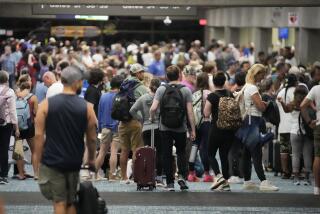No room at the inn? Maybe, but keep banging on the door
- Share via
BEFORE booking my airplane ticket, I carefully researched the availability of a hotel room in Barth, a small town on the Baltic Sea in Germany. In early November, the Ringhotel Speicher, the only hotel in this town of 10,000, had plenty of rooms when I checked on Expedia.
I waited three more weeks before trying to book the room. When I checked again on Expedia, I found a notice saying no rooms were available for my dates. I checked Hotels.com and Travelocity with the same outcome. When I checked the Ringhotel website, I got an error message when I tried to reserve a room online.
For the record:
12:00 a.m. Dec. 14, 2005 For The Record
Los Angeles Times Wednesday December 14, 2005 Home Edition Main News Part A Page 2 National Desk 1 inches; 33 words Type of Material: Correction
Internet reservations -- An article in Sunday’s Travel section about booking hotels using the Internet said Forrester Research was based in Connecticut. The technology and market research company is based in Cambridge, Mass.
For The Record
Los Angeles Times Sunday December 18, 2005 Home Edition Travel Part L Page 3 Features Desk 1 inches; 37 words Type of Material: Correction
The Internet Traveler -- A Dec. 11 Internet Traveler article (“No Room at the Inn? Maybe, but Keep Banging on the Door”) incorrectly reported that Forrester Research is based in Connecticut. It is based in Cambridge, Mass.
I began investigating alternatives -- nearby towns, spending just one day instead of two nights in Barth. I was to visit there for a story about Stalag Luft 1, a World War II prisoner of war camp in Barth. Herb Wangeman, my great-uncle, was held there for 15 months after the B-17 he was piloting was shot down over Germany. So I couldn’t pass up the opportunity to visit Barth. I even briefly considered a sleeping bag.
Still, something felt amiss. December is hardly a busy time for tourists in northernmost Germany, and the rates I had found were the lowest of the year. After kicking myself for not acting sooner, I decided to try again. Voila. Two nights at the Ringhotel Speicher suddenly were available on Expedia. Before it disappeared, I booked it, getting the same rate that was offered earlier.
The hotel probably was never out of rooms. What probably happened was some temporary glitch in the reservations system that provides the hotel inventory to so-called third-party reservation sites, such as Travelocity and Expedia. The important lesson is to check around when you find a hotel supposedly sold out.
Third-party travel websites can be misleading when it comes to running out of inventory for a particular hotel. Rooms might be available through other sources, such as the hotel’s site or through phone reservations.
The issue of a travel agency website saying that a hotel is sold out when rooms actually might be available came up last year. InterContinental Hotels Group stopped doing business with Expedia and Hotels.com over the practice. IHG is the parent company of hotel chains such as Holiday Inn and Crowne Plaza and has more than 3,500 hotels worldwide.
“We don’t want consumers to be misled in any way [that] a hotel is sold out when it’s not,” said Andrew Rubinacci, director of distribution and planning for IHG.
Here’s what happens: A website pays a hotel for a limited number of so-called merchant-rate rooms. Merchant rates are lower rates negotiated by a website for a specific number, or block, of rooms. The rates are lower to the websites but not necessarily to the consumer.
When it runs out of its block of rooms, the site then hangs out the “no-room-at-the-inn” sign and tries to steer customers to another, nearby hotel where merchant-rate rooms are available. It does this because its merchant rates are specially negotiated and are more profitable for the websites than selling through regular channels, says Henry Harteveldt, vice president and analyst with Forrester Research, a Connecticut-based online travel research firm.
“It is one of the most misleading, dishonest, reprehensible consumer business practices,” he says. “Travel agencies that don’t tell customers the whole truth end up risking the trust they spend hundreds of millions of dollars in advertising and site design to build.”
As hotels continue to drive more business to their own branded websites, the third-party sites become less able to dictate selling terms, which can be better for consumers and hotels. IHG saw online bookings on its websites (such as www.holiday-inn.com) increase from 78% of online sales in June 2004 to 85% in June 2005.
Hotels.com has changed the wording of its notice when it runs out of rooms. (Expedia declined to comment for this story.) Hotels.com now says, in large letters, “We’re Sorry ...” Then in the fine print, which is a fraction of the size of the apology, “There aren’t any Hotels.com rates left at the hotel you’ve chosen. We recommend the following similar hotels nearby.”
The effect on this consumer is the same: It appears the hotel is sold out. Hotels.com spokeswoman Nicole Hockin says it is working to improve the way it communicates to make it “more in line with what [IHG] asked for and better for the consumer.”
But not all third-party agencies handle sold-out merchant-rate hotels the same way. Travelocity, which continues to sell IHG hotels on its site, reverts to a special system to check on real-time inventory available to all sources.
“You’re giving the consumer the chance to purchase that hotel even if they don’t have merchant rates,” said Noreen Henry, Travelocity vice president of hotels.
So what’s a traveler to do after running into a sold-out hotel-room situation on a third-party site? If you’re not set on that particular hotel, you can simply book a similar hotel.
But if you really want that hotel, try other third-party sites or, my preferred way, the hotel’s official website, likely the most accurate source of information. And if you’re worried about getting the best deal, many hotels now have pricing parity agreements with the third-party sites, so you’re not likely to find a lower rate than at the hotel’s official site.
If you can’t find a room at that hotel anywhere, try later, as I did for my Barth hotel.
The bottom line: Don’t accept that a hotel is sold out after checking just one website. There just may be rooms at the inn after all.
James Gilden writes the Daily Traveler blog at latimes.com/dailytraveler.
More to Read
Sign up for The Wild
We’ll help you find the best places to hike, bike and run, as well as the perfect silent spots for meditation and yoga.
You may occasionally receive promotional content from the Los Angeles Times.






